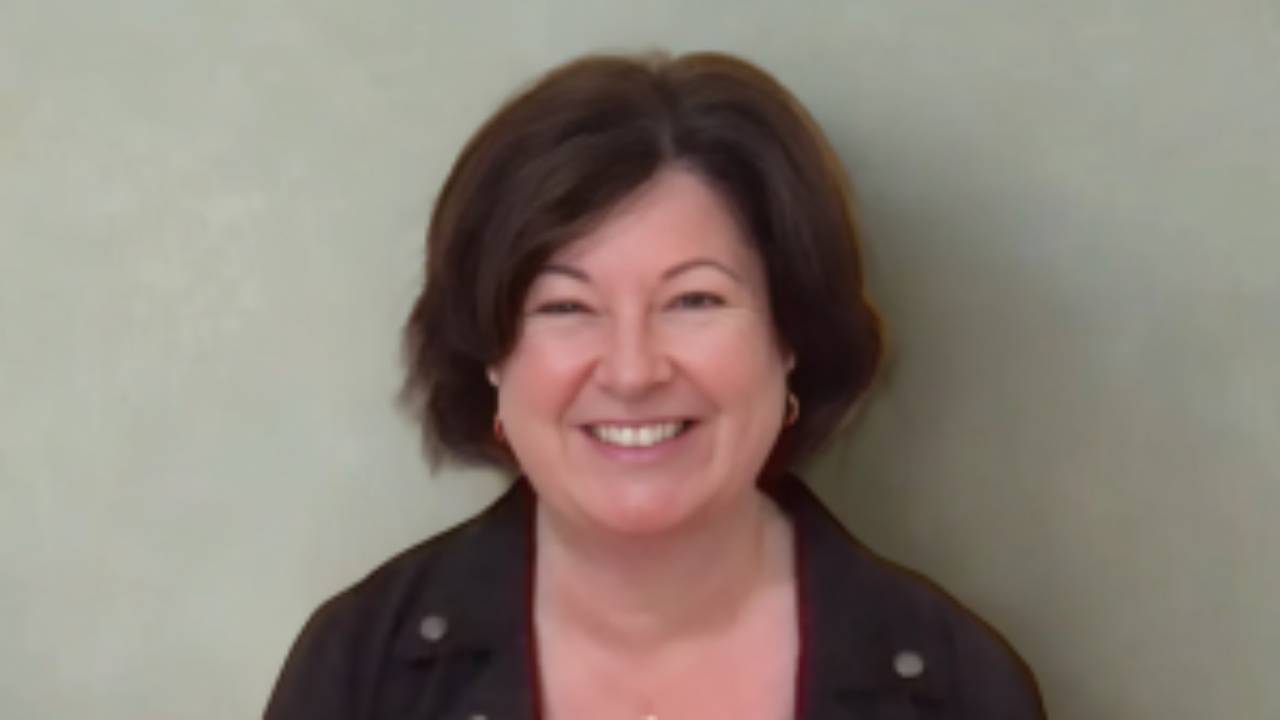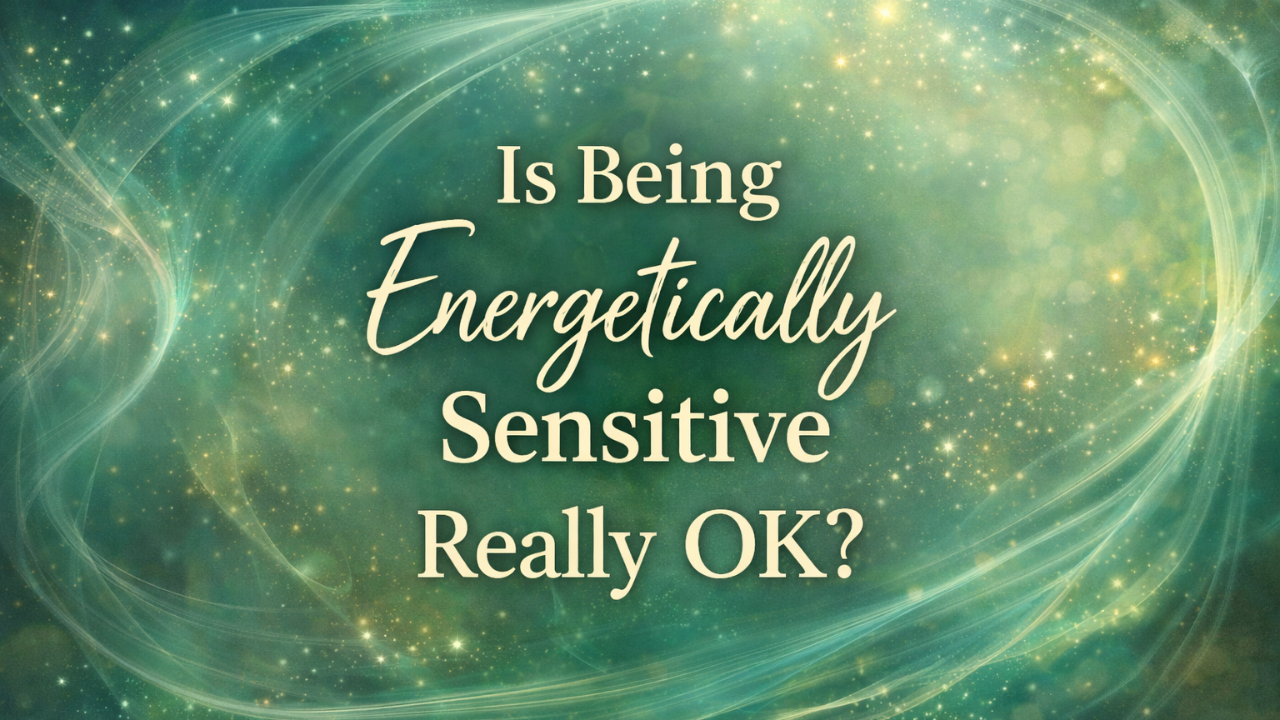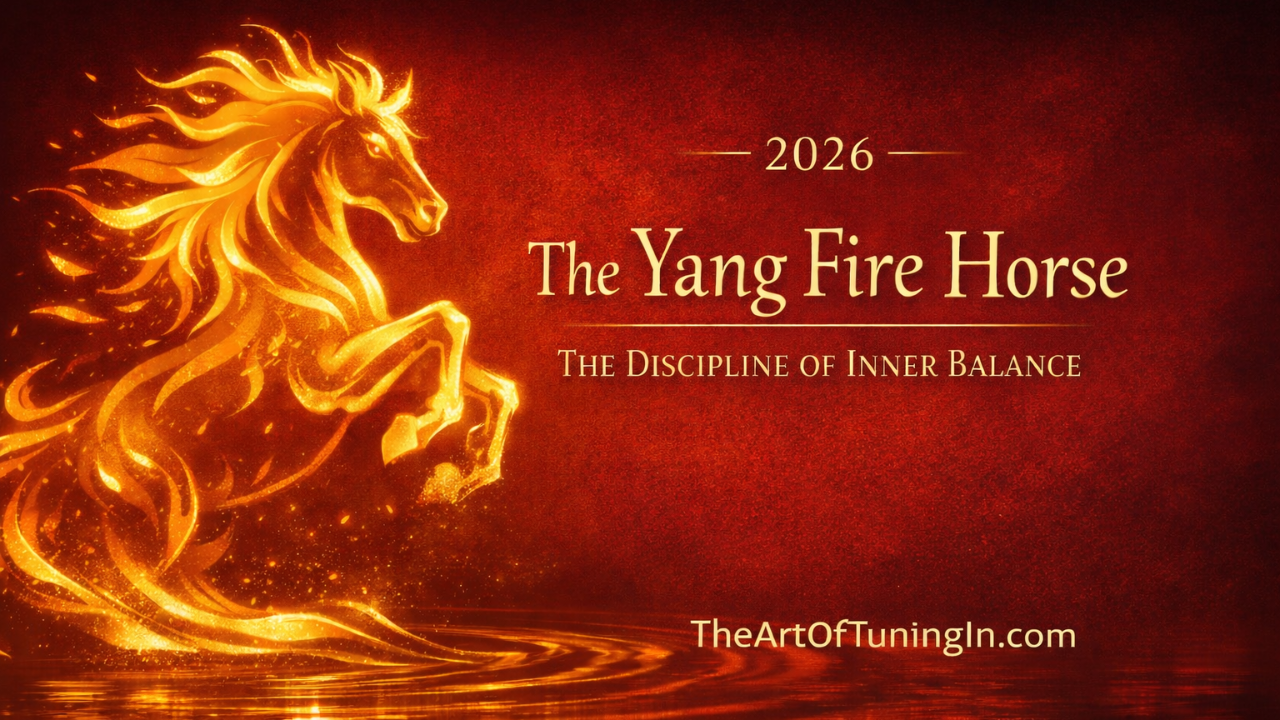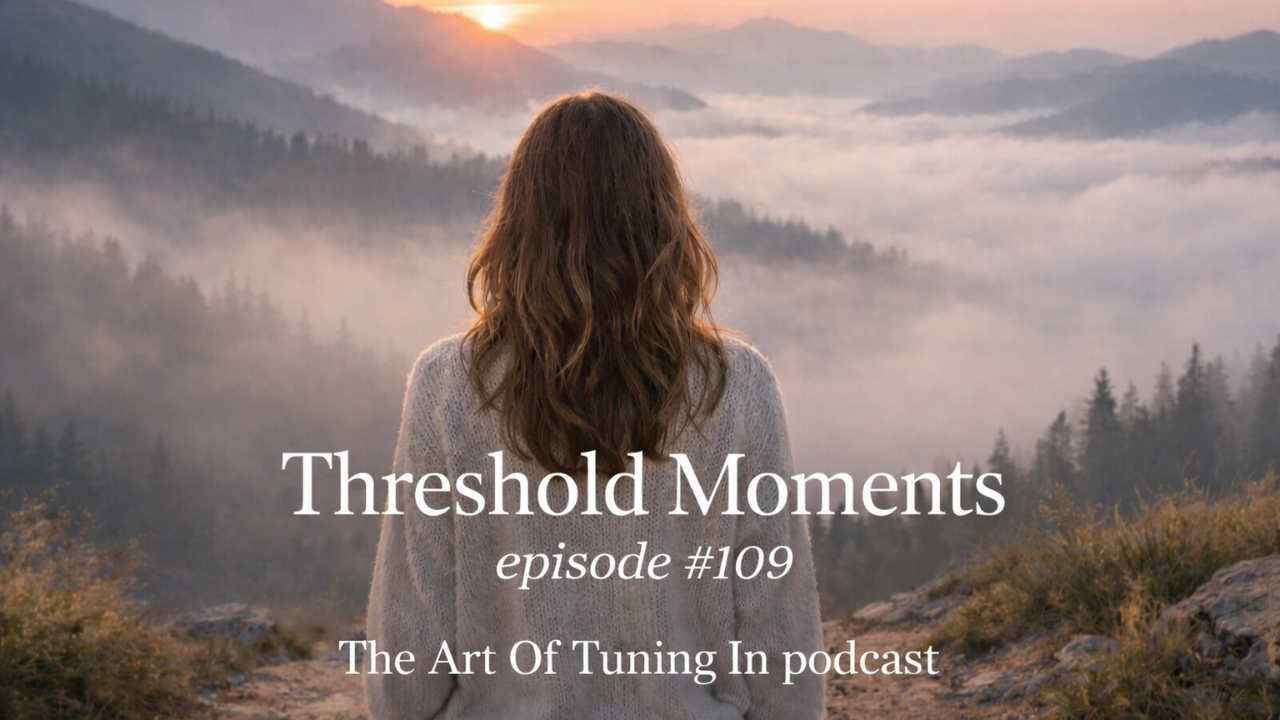Healing Grief - 4 insights to support your energy | #037
Feb 06, 2021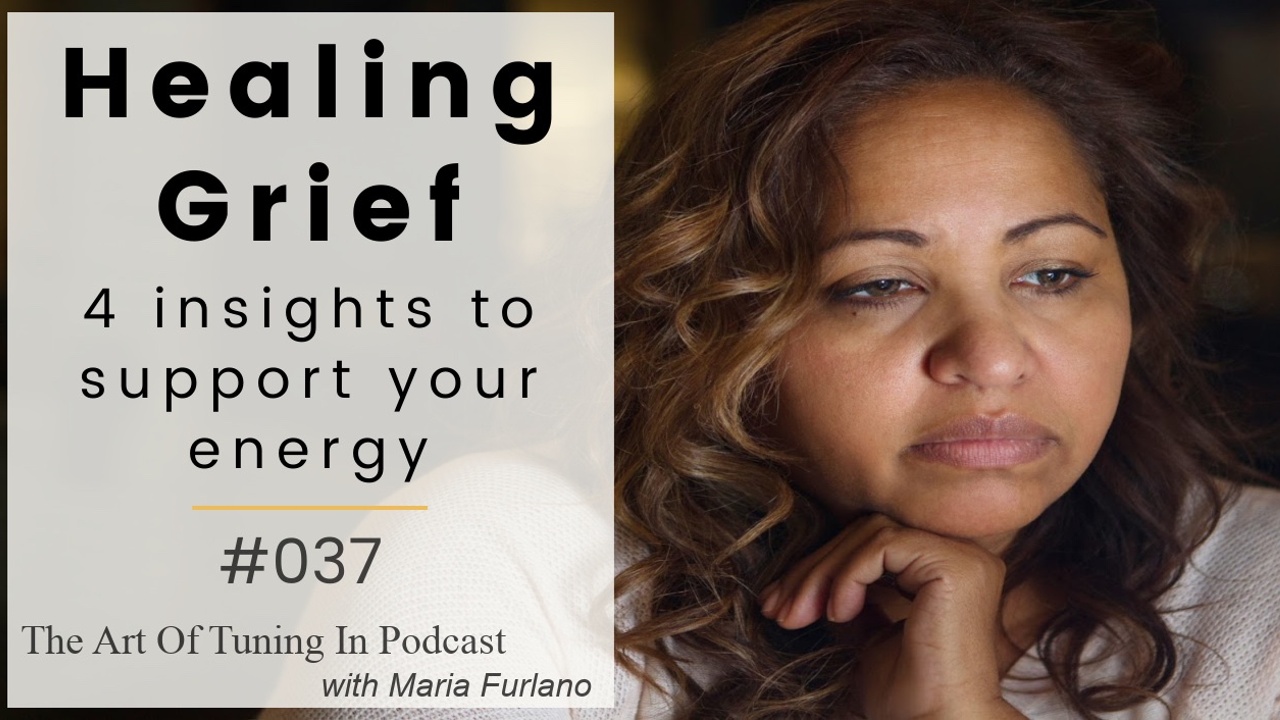
When we're dealing with grief it can feel as though we can't move sometimes. We can become completely overwhelmed and "gripped" with every kind of emotional overload. Sometimes we understand how we feel and sometimes we don't. Grief can be overwhelming, scary and fully exhausting. If you're feeling lost (or you know someone who is), I sincerely hope this episode will support you. In this episode I share a little of my own journey and 4 insights to support your energy, as you continue to move through your unique stages in healing grief.
I'd like to ask a favor - If you know someone who's struggling right now with a loss, please share this episode with them.
*Please subscribe to this podcast on your favorite app: Apple Podcasts | Google Podcasts | Podcast Addict | Stitcher | TuneIn | Listen Notes | Spotify | Player FM | Vurble
0:01 [Intro] Welcome to The Art Of Tuning In Podcast with Maria Furlano, sharing insights, tools and conversations to inspire your energetic well being.
0:17
Hello, everyone. Welcome, this is Maria Furlano. Thank you for joining me today. Good morning to you. Good afternoon. Good evening, wherever you're listening to this, I really appreciate you taking the time and tuning in with me today. Today, I'm going to be talking about healing, grief, moving through grief. And I hope to really be able to give you some processes that I hope will help you if you are currently grieving if you are also preparing to be grieving.
And if you have a friend, or anyone who is going through this, you might want to share this episode with them because it is my hope to truly speak from the heart in this episode and share some things that I have personally gone through some things that have helped and some things that I know can help in moments when we just feel gripped with grief.
If you're new to my podcast, I want to thank you for being here. I'm a healer and a master teacher. I'm a physician of Chinese Medicine. I specialize in Medical Qigong. And I work with people privately to help align their energy from anything from projects, career changes, relationship changes, health challenges, and of course, healing in all forms, which of course includes grief, I have an online membership called the art of tuning in if you'd like to visit and check it out, you are more than welcome. I would love to meet you over there.
And for those of you who have tuned in with me for a while thank you for coming back. It's great to have you here. As always, I appreciate everyone who spends a little time with me.
In the beginning of my episode, I always ask people if they will just take a deep breath with me. And if you take a nice long inhale and then create an even longer exhale, out your mouth or out your nose. That long, long exhale really helps to calm our mind. And it helps to calm the actual heartbeats that our heart is beating. And this relaxes our nervous system, it decreases our blood pressure. And it allows us to be present in the moment. And so if you'll breathe in with me take a nice long breath in and an even longer exhale out your mouth.
The more we practice this, the more that we just take a moment at all different times of our day, the more we bring ourselves right into the moment, and it becomes a habit to do so.
And in Chinese Medicine and Medical Qigong, grief really holds its energy in our lungs. And so if you are someone who is experiencing grieving right now, or if you've experienced a great deal of grief, you may remember that feeling of real heaviness inside your lungs, I was reminded of this, taking a walk this past week, myself, two and a half years ago, I lost my mother and she had cancer. And for three and a half years, it was a wonderful time in the sense that I knew that she would be leaving and transitioning. So I was able to really focus and spend the time with her. But it was also very difficult because you're caring for someone and it's a great deal of care if you've ever had to take care of someone who is very ill, you know that it is extremely physically draining because of, you know, the 24 hour a day kind of care that's needed, especially if they're home.
But it's also emotionally draining because it is painful to go through this. And nobody wants to go through this and nobody wants to see someone that they love suffer. And even though it's something that you want to be there for, you know, I don't regret a moment of it. I'm so honored and feel so blessed that I was able to be there. It was thoroughly draining on my energy. And there was a lot of healing that needed to be done.
When my mother transitioned, there was a lot of physical healing that needed to be done for me to recoup my energy, my adrenals you know, to really heal my own energy output that I gave and then you have on top of that the emotional healing of course that's needed because you lose someone who you just love so dearly.
So I am very understanding of people who have to go through this process and unfortunately I had a similar process with my father as well who passed about 15 years ago. And of course, like everybody in the world, I've had friends who've unexpectedly passed away. And that's a whole different kind of feeling. You don't realize that, you know, they're there one minute, and then the next minute, they're gone. And so you have a whole shock.
So I've been through it all, I've been through the preparation of preparing someone to transition and knowing that there will be an end coming. And I've been through the shock of, you know, one minute, somebody's there, and the next minute, they're not. So I get it, I get the physical exhaustion, I get the emotional exhaustion, I get the mental exhaustion.
How do you get through the gripping pain?
And one of the things that I've been asked by private clients and by actual members in my membership is how do you get through that gripping pain, that gripping feeling in your body where the the the grief feels like it just takes over, it just grips your entire body and I thought that word gripping was such a good explanation and description of what it feels like because it does feel like sometimes you've just been hit by something right, and just kind of taken. And that's emotion, of course. And that's energetic movement.
And so I want to share with you some things today that I really hope can help us in those times, even though it's been two and a half years since my mom passed, which really is not that long when you when you think about it, but sometimes people get into timeframes. And they think, well, it's been this long, and I should feel this way. And the truth is, it could be 10 years, 15 years, 20 years, and you'll feel exactly how you should feel for you in that moment. And I was taking a walk and I felt this heaviness in my chest.
And as I was explaining about, you know, the lung energy and the grieving the grief that's held there, the energy, and that's a very kind of suppressed and heavy feeling. And I was walking and I thought, Oh, boy, it's just sitting there. And I knew I was really missing my mom and I was thinking about things. And I could just feel the energy sit there.
And I thought about these questions that I've been asked about how do you heal from grief, those different times, when you're just dealing with the depression, of missing someone, even if you've gotten used to them being gone, you're never really used to them being gone. But then there's the overwhelming feeling.
A lot of times when something is very new, and you just experienced the loss. And then there's all the times in between. And I want to just share that the physical mourning that we go through with actually missing the physical person is a real thing missing, how they feel, how they hug, how they touch, how their voice sounds, how they smell, there is a physical mourning that must be done. This happens with people, this happens when we lose animals. Grief is grief.
And I share this because some of the processes that I'm going to talk about today, they work because we come to an understanding that we accept the process of healing and not try to rush through it.
Grief can be terrifying to people, because it is so overwhelming. And it can make you feel so out of control. And if you're someone who's trying to just get through your life, if you're trying to take care of your family, trying to keep your job stable, trying to stay healthy, trying to do all of these things. It can be absolutely terrifying to think that you could allow this grief to come up and out and that it will actually release and not take over your whole life.
And it's why people usually don't really allow the grieving process to happen, why it's delayed. And the reason why it's so important that it's not delayed, that you allow the many, many stages of grief to come out is because again, that energy is held in our bodies.
And over time that energy continues to stagnate, and it continues to build. And so the grief becomes worse. It transforms into different feelings. It transforms it can transform into depression, it can transform into real fatigue, real draining of energy, just because we haven't let it out. So naturally, of course I'm going to say that there are grief counselors, there are people out there there are grief therapists there are coaches there are healers who absolutely can help youpProcess grief.
And it takes time, there are stages, and you can have that support. Some people process it on their own. And that's great too. But if you need help, if you need support, of course, there are people out there. And I just want to remind you that there are people out there.
So that gripping feeling of grief that comes over people at times, sometimes out of the blue, maybe you saw something and remembered something, maybe you smelled something. I've been in situations before where I was feeling perfectly fine. And then all of a sudden, a topic came up. And I remember years ago, I was in school. And I went back to school after my father passed away. And all of a sudden, the topic in class that day was cancer. My father passed away from brain cancer, and it was quite, you know, an ordeal as anybody who's been through anybody with an illness knows, and I thought I'd be fine. And then 15 minutes into class, all of a sudden, I began having an anxiety attack, and I don't have anxiety attacks. So this was a total surprise for me, I stood up, I went outside, and I realized you're having an anxiety attack, my heart was racing, I was breathing, I, I couldn't, you know, calm down. And because I was lucky enough to realize that I was having an anxiety attack. And because of the training that I've had, I was able to say, oh, you're having an anxiety attack. Okay, let's start to breathe, let's start to walk, let's get fresh air. And I have to admit that I was amazed that these feelings just rushed up to the surface like that, with no real warning that I saw.
When I look back, I realized that I probably should have taken a little more time that I wasn't really ready to jump back into school, that I was pushing myself a little bit hard that I needed more time to heal. But like everybody else in the world that we tend to do, I was just trying to go on with a normal life and get things done and be responsible. And I learned a lot.
And I learned a lot about how our bodies will react, that energy inside of ourselves is going to move, we don't want to numb ourselves out. And this is a big thing. When you start to feel grief, when you're going through grief and you're afraid you're afraid to have the feelings come up.
A lot of times we start to shut down and we start to numb out our energy, not really meaning to hurt ourselves or to try to cut ourselves off. We're just trying to protect ourselves. And we can do what's called dampening down, we just dampened down our emotions. Sometimes we start eating more, sometimes especially sugar comes in, we can start drinking or taking certain drugs to just kind of numb ourselves out. But what this does is it just pushes the feelings deeper. And again, it stagnates. And that energy is still building, it's still there.
What I'm wanting people to understand is that energy is a vibration. Emotions are an energetic vibration. And those emotions take on forms in our body of energy, and they become stagnated. And by moving, we help shake it up and release. And a lot of times that release that, that final bit of releasing comes from crying, or being able to speak our mind, sometimes laughing, letting it out that helps to open up the heart.
But sometimes in our culture, we're told to, you know, just get through it. Just keep pushing through it. grieving is a process. And it's an important process. And the thing is, is that it is a process that brings up so much enlightenment in your life, that by someone not going through the grieving process by not taking the stages to go through the different feelings of different emotions or different realizations that they're receiving. They're cheating themselves. They're cheating themselves have the growth that this situation has brought into their life. It's a gift. The growth is a gift. There was a reason why all of this happened and there is so much to learn. Another thing that comes up for people, a lot people that I work with is they start to begin to get scared because they are very, very tired. And they're very worried about their health. Absolutely, of course. Go get a checkup, go talk to your doctor, make sure everything is okay. But I want to just remind people again, that grief settles in our lungs. When we breathe, it gives us energy. And when our lungs are sad, right, when the energy of our lungs are sad, when our heart is sad, there is a pressing of energy. And there is a draining of energy.
When you think of the word depression, what is it, it's depressing, the energies being depressed, that's going to make you feel exhausted. So if you're going through grief, understand to that, especially if you've gone through a process, like you've cared for someone, and then they've transitioned, you're also dealing with the adrenals, that are in your kidneys, your adrenals, that had been drained, the Energy have been drained, you're actually physically drained, you gave a lot of output, you gave a lot of energy, and you're physically tired. So you have that going on. But then you compound that with grief of the lungs, and now you have another pressure in your body, perhaps you're dealing with some fear, because maybe you don't know what's going to happen next.
Or maybe you're dealing with an entire life transition, the fear also drains, so I don't say this to sound depressing, or to, you know, create a real, you know, depressive mood here. But I want you to know that it's normal. It's really, really normal to feel tired when you're grieving. And that fatigue can last a really long time. Now, again, if you're feeling tired, and you're feeling physically funny in any way, feeling achy, go to the doctor, get a full checkup, and do it often and make sure you're okay. But also know just to ease your fear a little bit, that fatigue is a real thing when you're grieving. And so when I talk about pushing, when people continue to push through their lives, they push to show up, they push to finish things when they're grieving, know that you're already tired. And if you continue to push through, all you're doing is draining more energy. But I understand and I know for myself too... When I'm was going through my own process, I caught myself all the time trying to push through, because I didn't feel like dealing with the pain of the grief. But it catches up with you, it catches up with you until either you're finally so tired that you just can't function or you become so emotionally drained or depressed.
And so you have to heal it anyway.
And I'd like to share with you some processes today, some thoughts, some tools that I hope will really help.
Tune in to how you really feel
And number one is understand how you feel is how you feel. And it's okay, and you don't have to explain yourself to anyone. This is really important, again, because people think that there is this timeframe on morning. And you can feel like you have to put on a happy face in order to be in an environment. And I just want to remind you, there is a process to move through. I'm not saying to go into a deep dive depression. And you know, just be a jerk to everyone around you. Because that's how you feel. But I am saying is that honor how you feel. And you don't have to explain how you feel to anyone. And you don't have to act any different. But you have to honor how you feel and know that it's real.
Gently ease back into life
Number two that I want to share is to gently ease back into your life. I just explained that honoring how you feel is really important. And as I say to gently ease back into different aspects of your life, and be honest again with how you feel. Don't take on projects because you're trying to look for normalcy. Really be aware of what I shared in the beginning of this episode about the energy draining that we experienced through grief.
And not only through the process of grieving, but afterwards, and even when we start to feel a little better. We're still healing.
So be aware that you gently ease back into Life and that that's okay, you're not missing anything, you're not lazy, you're not taking too long. Just be gentle with yourself in all areas.
Move your body life flowing water
The third thing I want to share has to do with the physical body, and the energy of the physical body. A gentle form of movement is really, really important. Now, before you get, you know, where you start to push me away on this, I want to explain what I mean by this. And the reason why I know that some people will push me away is because when we feel tired, when we're grieving, sometimes the last thing in the world we want to do, or we want anybody to tell us to do, is to move. Because we think, oh, it means I have to go exercise, you know, I don't feel like moving, I feel stuck, I feel sad, I just want to sit here, totally understandable. And you feel how you feel. And that is okay.
When you can move, I just want you to understand the process of it. So that you know that there is helpful tool for you. So when I talk about gentle daily movement, I'm not talking about going out and running, or going out and being on that elliptical for 30 minutes and sweating your butt off, I'm not talking about that, unless that's something that feels really good to you.
You may not have the actual physical stamina to do that when you're grieving. And a lot of people don't understand this, they actually, this is another form of pushing themselves, they actually think I've got to go out and I've got to move and maybe you've been someone who has exercised a lot and you're like, I gotta get back to normalcy, I got to do this.
And a lot of my clients will come to me and say, Oh, my gosh, you know, I I started to go for a run today. And I was literally out for 10 minutes. And all of a sudden, I had to stop because I could barely breathe, I was so tired. I think there's something wrong with me. And again, I will say to be very protective, go to the doctor and get a checkup if you feel that way. But also know that grief is exhausting. And it is so normal to run out of breath. When you're grieving, it's so normal to feel that heaviness, you have that adrenal energy. Again, that's probably pretty low, when you're healing. It's not, there's not enough energy there.
And so as you go out, and you start to do things that you used to be able to do, like you work out the way you used to your body may not physically have that energy to spend. And it's really just as simple as that. So you have to slowly rebuild the energy, it can be scary for people because they think I'll never have this energy. Again, I'll never feel normal again. And that's a really real feeling. And you will feel normal again, you can feel normal again, you can rebuild your energy. There are lots of soul Mind Body practices that rebuild energy. So please know that because that is a scary thing.
One: Breathing is a form of movement
So what I was saying about gentle movement, daily gentle movement, this is what I mean by that. Gentle movement includes a practice of deep breathing. So learning how to sit or lie down, or stand and really breathe in your diaphragm. In my membership, there's something I teach that's called six directional breathing and you're actually breathing in six directions, and it is so fortifying. And it's not hard to do, it just takes practice. But the goal is to breathe deeply into the diaphragm - not into the lungs - really allow when you inhale, your belly expands. And you should feel that expansion in your back as well. You should feel it on the sides of your body, you should feel it above and below. And this expansion allows the energy allows the nourishment of energy to be brought down through your body and it helps build your chi helps build your energy.
So deep breathing practices are a form of movement. They're a form of gentle movement, they help move the lymphatic system, they help with circulation in your body, and they help move energy in your body that gets very stagnant with grieving. So that's number one.
TWO: Stretching allows emotional circulation
Number two, gentle stretching, right we all know this. When we move our body and we stretch in different ways. We actually begin to squeeze our body again we're squeezing our lymph we're moving our circulation and it helps to flush out toxins in our body but it also helps. To move gently a circulation of emotional energy in our body. And that's really, really important. If you're a member in my online membership, you've learned shaking the bones, which is a gentle practice where we shake the body. This is a wonderful tool for working with emotional grief and emotional stagnation.
- Also taking baths, taking a bath and using Epsom salt, using beautiful smelling salts like lavender and bergamot and things that really helped to ease the energy of frustration of anxiety. But it also circulates the body. It's a great detoxifying tool besides being relaxing, and allowing yourself to be nourished, the water, the warmth, the salts, that helps to move the energy and move the circulation and move the lymph and move toxins in the body, so it is a form of movement.
- Dry brushing with a brush with a towel. Again, we're moving the lymph in our body removing circulation.
So you can see my theme here, right? It's really about taking care of the body and getting the body to have movement doesn't mean going out and running a marathon or going you know through a full class or doing things like you're normally doing them. These are self care tools, you can do something different every single day.
THREE: Shorter bursts for relief
But the more that you do it, the more often the more frequent you're able to do it in your life, the better you will feel the goal with grieving is we need to create those short bursts of feeling better, you may need to do your deep breathing practice 10 times a day, you may need sometimes to do a deep breathing practice all night long, especially in the beginning.
But if we give ourselves these moments of respite, if we give ourselves these moments of really being present, of really having self care, what it does mentally for us is it begins to show us that there is a space for us to feel just a little bit better, that we may just get through this, that there is hope. And that's really, really important when we're grieving because it's real.
FOUR: Write a letter
And the fourth thing and final thing that I want to give you today to think about is that when you are actually gripped with emotional grief, when it's overwhelming. When it's all coming up. Of course, I'm going to tell you to let it out to cry, to speak how you're feeling to communicate. But I'm also going to share that if you can write a letter, if you have a journal or you have a piece of paper, if you can begin to write the person that you're grieving a letter and let it be freeform.
Don't worry about what you're saying, allow it to get out of you. You might be mad at the person for leaving, let it out, you might just miss the person so much. Let it out. And if you can't write or you don't like to write, I always tell people you can speak it, you can just stand up and start speaking. But there's something about when we take a pen or a pencil. And we start writing freehand on a piece of paper. There's an energetic movement that's happening through our body, we're actually taking what's inside of us. And we're releasing it through a writing tool onto a piece of paper. And it is transformative.
If you don't want things sitting around your house, you can always shred that piece of paper afterwards. I know some people they worry about having their feelings around. And so I just shred it, but it's the process of getting it out.
Sometimes in the middle of the night, when it's three 4am in the morning, and you're dealing with processing, maybe you can't scream and shout, maybe you have a family. Maybe you have children sleeping, maybe you can't run out of the house. And you probably shouldn't three or four in the morning. But you can take out a piece of paper and a pen or a pencil and you can start writing how you're feeling and you can start to release.
You can start to move and gently stretch you can begin a process of healing. Really, really try not to shut down those feelings and try to get through the night. Really use tools that are all around you. There are meditations you can listen to go and listen to a spiritual issue. inspirational speaker on YouTube, you know, put in your headphones, and listen to people who inspire you use people, tools, books, writing movement. To get through these moments, don't do it alone. I know that a lot of times, you know, the reason why I speak of the nighttime is because these things come up at night, you know, the moment it gets dark, until the next morning, when it gets light can be really rough for people.
Mornings can be awful
And I also know that when you're going through grief of any kind, the mornings are really, really rough time for people. A little suggestion that you might want to try is not staying in bed, actually, when you wake up, get up, move, breathe.
When we sit and we lie in bed, we can go into a depressed state because we're ruminating in our mind over and over again, what we're feeling. And I'm not saying to suppress your feelings, that's not what I'm saying. But I am suggesting that we don't ruminate in them. When we ruminate, the energy just becomes bigger and stronger and overwhelming and overpowering. So waking up and getting up. Now's the time, you know, to shake out your body, to wash your face, to go outside and to really breathe in some fresh morning air. It will help a lot in this process as you're moving through these emotional states.
I really hope that today, there has been at least one thing, one tool that you can use one insight that might help you to know that you're not alone, that you're doing everything right. That how you feel is how you feel and it's okay and that whatever timeframe you're in. That's the timeframe you're in and it is up to you and it's your life and your healing. I thank you for being here. I thank you for being everything you are and I will see you in the next episode.
32:07 [Outro] Thank you for tuning in. If you'd like to learn more and elevate your energetic wellbeing, I invite you to visit The Art Of Tuning In Podcast comm where you can learn all about our online studio. I look forward to meeting you there.

